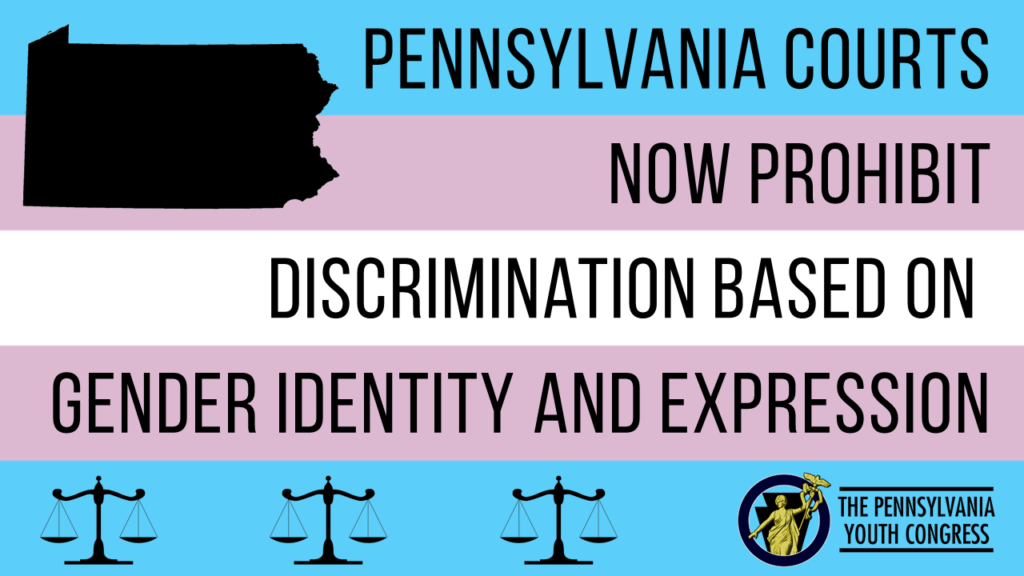 We are thrilled to share that the Pennsylvania Supreme Court has revised the Unified Judicial System’s non-discrimination policy to include protections on the basis of gender identity and expression. This policy is now in effect at every court under the Supreme Court’s jurisdiction, including the Superior, Commonwealth, Common Pleas, and Magisterial courts. The policy must be adhered to by court employees, as well as district attorneys and lawyers engaging in court-related matters.
We are thrilled to share that the Pennsylvania Supreme Court has revised the Unified Judicial System’s non-discrimination policy to include protections on the basis of gender identity and expression. This policy is now in effect at every court under the Supreme Court’s jurisdiction, including the Superior, Commonwealth, Common Pleas, and Magisterial courts. The policy must be adhered to by court employees, as well as district attorneys and lawyers engaging in court-related matters.
In June 2016, we approached Allegheny County Common Pleas Judge Christine Ward to propose this update. Judge Ward brought the proposed amendment to the Supreme Court which adopted the policy in in July. A judicial system-wide memo was distributed in August to all Justices, Judges, Magisterial District Judges, and state-level judiciary employees announcing the new policy.
We regard the amended non-discrimination policy as a seismic shift toward ensuring dignity and respect for transgender Pennsylvanians.
Actions that are now prohibited range from harassment by court employees toward transgender people, to prohibiting judges from discriminating against transgender people in open court. Additionally, court employees who are transgender are now explicitly protected against discrimination and harassment in their workplace. To address violations of the policy, members of the public and court employees may file a complaint which will be handled as are other cases of discrimination within the state judicial system.
Throughout the commonwealth, transgender people have shared how judges, court employees, prosecutors, and attorneys have been known to discriminate and demean them, both in personal interactions and in court proceedings. However, as the update reflects, the judiciary includes many judges who are supportive of fully respecting transgender people.
This is a significant moment in ensuring justice for all in our judicial system. Many transgender Pennsylvanians have too often had terrifying and traumatizing experiences in our judicial system. We are incredible proud of the Supreme Court’s declaration that transgender people must be regarded with dignity. This policy is instrumental in paving the way forward for openly transgender judges to serve across the commonwealth.
Ciora Thomas, founder of the transgender women of color support network Sisters United in Pittsburgh, reflected on the importance of this update. She said, “I am thrilled to know a safer and dignified future for trans people is becoming a reality. Now we can stand in front of any judge and be respected as women, men, and people, without being misgendered or incorrectly named. We now have the dignity we deserve as American citizens.”
Several years ago, Ciora was before a local magistrate for a minor traffic citation, where she was relentlessly harassed by court employees and the judge. In open court, the judge only referred to her by her birth name and forced her to remove her hair. She complied in the dehumanizing process in order to avoid judicially-imposed consequences. She would now be able to file a complaint and see through a charge where the court employees and judge could be disciplined.
Deja Alvarez, Director of the LGBTQ Home for Hope in Philadelphia, the first LGBTQ homeless shelter in Pennsylvania, said that the new policy “will help empower us to fight against any injustice and bias perpetrated against Trans* communities in the courts. This is a landmark moment in ending discrimination in a system that directly affects our ability to live, where our community is often unjustly put through the criminal justice system at alarmingly high rates.”
The full policy can be found online at the Unified Judicial System’s website, along with the complaint forms.
